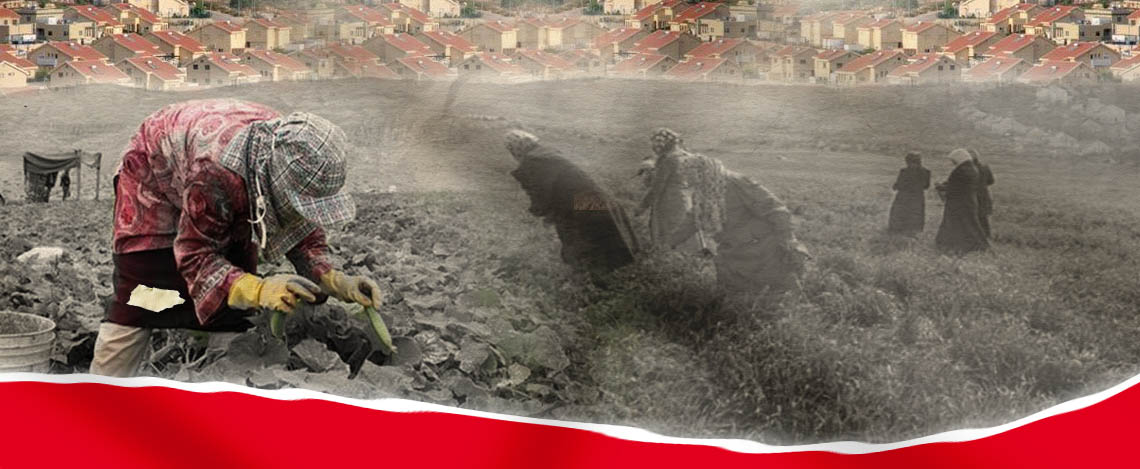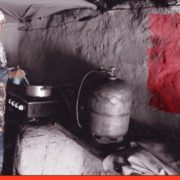Palestinian female workers in Israeli settlements : infringed rights and dignity
Introduction
“I’d hear it pretty often. It’s normal for Arab bosses [working for Israeli employers] to come and tell you: “this is your last day of work at the settlement.” In fact, I’d rejoice hearing this, as if I were celebrating the Eid. However, the only question that remains is: what will I do? How will I cover my expenses?”
This paragraph probably sums up much of what has been said about the Israeli settlement activity and practices over decades, especially with regard to the transformation of the Palestinian economy into a fragile one and dependent on the Israeli economy. This has been made possible by the settlements’ takeover and control of natural resources, borders and land confiscation. This, in addition to turning Palestinians from landowners and producers to workers either inside the Green Line or in the 1967 Israel-occupied lands, where Israeli settlements were erected. This was further complicated by the violations of the rights of Palestinian male and female workers and the humiliation they have been subjected to.
It helps to explain the relationship between the Israeli employer in the settlements and the Palestinian workers, both male and female. The result would be a deeper understanding of the mechanisms of control employed by the colonial system in place to influence the behaviour of the colonised, pushing them to prioritise profit over national rights. These mechanisms gradually expand from the workplace to include the wider Palestinian communities.
To dig deeper into this, I met a group of Palestinian female workers from al-Jiftlik village,[1] located in the Palestinian Jordan Valley area north of Jericho. They work in Israeli settlements. I asked them about the details of their daily work routines, challenges, fears and any possible job alternatives if they left their work in the settlements.
The Big Boss, The Little Boss
The Israeli employer relies in his/her relationship with Palestinian female and male workers on Arab brokers who act as compradors. These brokers bring in Palestinian female and male workers to ensure the wheel of the Israeli economy continues to run, bearing in mind that the industries where these workers do their work are established on Palestinian lands occupied by Israel in 1967. That is, these lands, now confiscated under different pretexts, are originally owned by indigenous Palestinians.
According to Palestinian female workers, Arab brokers in Israeli settlements can be classified into two categories: the big boss and the little boss. The former employs a number of ‘small’ brokers (or little bosses) distributed across several geographical areas, and whose mission is to look for women workers, verbally contract them to work inside the Israeli settlements and commit to transferring them from and to their workplaces. Female workers fall under the direct supervision of these ‘small bosses’. Small bosses, in turn, fall under the supervision of the ‘big boss’, where the former provides the latter with a list of the names of female workers they are responsible for.
Estimates point out the presence of 35,400 male and female workers in Israeli settlements, classified under informal employment because they are deprived of all the rights stipulated under the Israeli labour law (Saad, 2020). Women do not have the luxury of choosing the place and type of work they want to do. Rather, they are forced to accept any job that’s available in factories or farms. It’s also possible to have female workers move between jobs during the same year, depending on the harvest season. For instance, they may work in vineyards, and when their season is over, they move to harvesting dates, and so on so forth.
Female workers in Israeli settlements are forced to remain silent over all the violations they are subjected to. In my interview, I was told they could not file complaints in case the work was tougher than they could handle or if they suffered exhaustion as a result. They also couldn’t complain over the harsh conditions, such as working immediately after rainfall. This makes it harder to harvest the crops, since they are forced to do so according to established standards.
During the times Palestinian female workers tried to object and demanded their work conditions be improved and their physical abilities respected, the Arab boss’s response was that their only choice is to leave work because he couldn’t afford to bring in any temporary replacements. Hence, they are exploited as a result of their bad economic conditions, desperate need for work and knowledge deep down that they could be easily replaced for good through the network of lower-rank bosses spread across the Valley area.
Mechanisms of control and domination
Israeli employers have succeeded in creating the Palestinian comprador character they wanted, always working in the interest of Israeli employers. According to female workers, only in very exceptional circumstances does the Israeli employer contact them. When that happens, it’s in the context of giving instructions regarding their work performance. The Israeli employer supervises work via installed security cameras. If he finds out about any work disruption, he calls in the Arab boss to keep him informed.
Mistakes made by female workers are punished by their employers, starting by reducing their payment and ending by firing them, sometimes forcing them to pay a fine of up to ILS 20,000 (USD 7,500). In cases where female workers are involved in fights, the Palestinian comprador keeps watching without any attempt to interfere and end the fight that could cause harm to people and property. Once the fight ends, he calls those involved and inquires about what caused the fight. He makes a decision after that, which does not necessarily give justice but is rather beneficial to the work he’s overseeing. One of the female workers also said that the Arab boss always tells female workers that it’s in their best interest not to interfere in these fights.
The Israeli employer always uses the security mindset when dealing with workers. Because of this, female workers are forced to hand in their mobile phones when they start their day. The pretext for this is to guarantee they will not get carried away during work. The Israeli employer does not care about women’s conditions and their need, at times, to use their mobile phones to make sure their family members are doing well.
One of the women interviewed had a sick child she’s forced to leave at home, and there’s no one to care for him in her absence. The rest of her children are also too young to take responsibility and instead need to be cared for as well. The only way to reach female workers in emergencies is by contacting their little Arab bosses. It is left to these bosses to decide how urgent the situation is and whether they need to inform the workers in question or wait until their shift’s over. All of this would need to happen while ensuring that the work’s progress continues uninterrupted and unaffected.
Also, Israeli employers use collective punishment as a policy in case of work violations, specifically, when they learn that one of the workers did not hand in their mobile phone at the beginning of their shift. Punishments for this kind of behaviour are one of two: the first is to deprive workers of the 10-minute breaks every two hours to drink tea or coffee. Instead, they’re only allowed a 30-minute breakfast break. The second is to deprive workers of sitting on their work chairs. This means, except for when they have their breakfast, these workers have to do their job standing from 6:00 am to 2:00 pm without any regard for their health, especially older women, as is the case with one of the interviewees.
Of the other tools of control used by Israeli employers and the Arab compradors is to turn workers against each other. When asked why they did not protest against this policy of collective punishment by either organising protests inside their workplace or going on strikes, the interviewed women said they tried but faced divisions among Arab compradors. Some of them supported their protest, but others opposed it. Instead, the latter heeded to Israeli employers’ threats to fire them and send word to all farms and factories not to employ them. In this sense, Palestinian workers’ desperate economic situation is used to pressure them to accept any work conditions placed on them.
The economy over national rights
Rumours among female workers have it that if they want to continue to work, they are only able to do so as long as they do not make ‘trouble’ and instead focus on their jobs and nothing else.
Female workers with low income and without an education are exploited. Their rights are violated in broad daylight. Some of the women interviewed stated that they are contracted verbally on a monthly salary, paid daily at ILS 85 (USD 24), in addition ILS 12 (USD 3.5) paid for every additional hour they work after their shift ends. However, in the Israeli labour law, the minimum wage is ILS 5,300 (USD 1,540). The hourly rate is at ILS 29.12 (USD 8.5). This happens at the time Arab compradors gain large sums of money estimated at a monthly salary of ILS 21,000 (USD 6,100) at least.
A risky work environment
Job losses are not the only concern female workers face. Instead, there are a number of other concerns they do not usually address. These include the risk of slipping and incurring injuries during work, which could lead to permanent disabilities. Other workplace incidents include being hit by a power cable, facing fires and the lack of proper fire exits in factories, which contain only two gates/doors: one for vehicles and the other for workers, which means evacuation is a difficult task.
Female workers also fear acts of vengeance by settlers. One of the women said that she often fears if a settler entered the workplace and opened fire, who’s going to protect them? How should they behave in this case, especially when factories are not easy to evacuate in cases of emergency?
Another concern is the Palestinian community’s perception of women working in the settlements. Some Palestinian men would not propose to them because of their work. One of the young female workers said that members of her community in the al-Jiftlik area don’t really object to women’s work in the settlements, since the majority of women there work in the settlements anyway. Hence, it’s not something frowned upon in her case. However, people from other Palestinian areas look with suspicion at these women when they know they work in the settlements.
Conclusion: What’s the alternative?
In the end, the women interviewed expressed their desire to leave work in the settlements, especially that their work motivations are related to their need to earn an income for several reasons, including helping or caring for their family. Others do so to be able to pay their university fees.
Alternatives to working in the settlements do exist. These women have ideas of their own to start small businesses inspired by their current work in the settlements, or through skills they acquired from training workshops. Some of the women even prepared a detailed feasibility study for their projects. However, the problem lies in marginalising women in the Valley area.
Some organisations are active in the Valley area, especially those aimed at women’s economic empowerment. However, these efforts are not enough. In addition, the Palestinian Authority’s role seems non-existent in these areas, especially that they are in Area C, which falls under Israeli control. The Israeli occupation, in turn, spares no effort at suffocating indigenous Palestinians to push them to emigrate.
References (available in Arabic)
- All Rights (website), Employment and Workers Rights, shorturl.at/fgkCF, www.kolzchut.org.il/ar
- El-Far, Sherine: Brokers who financially and sexually exploit Palestinian workers in the settlements, investigative report by Watan News Agency and ARIJ network, 9/2/2013 shorturl.at/DLPQ4, https://www.wattan.net/en/tv/77981.html
- Huneiti, Ahmed: Al-Jiftlik Village: Society and Economy under Settler Colonialism. Journal of Palestine Studies, 2019.
- Palestinian Central Bureau of Statistics, General Census of Population, Housing and Establishments 2017: Summary of Final Results of the Census – Jericho and Al Aghwar Governorate, Ramallah – Palestine, 2019.
- Saad, Shaher, The economic effects of Covid-19 pandemic in the West Bank on small and medium enterprises, the challenges and opportunities for recovery and resilience. The proceedings of the closed dialogue session, MAS Institute, Ramallah, Palestine, 8/31/2020.
- The Applied Research Institute – Jerusalem (ARIJ): Al Jiftlik Village Guide. 2012.
[1] https://en.wikipedia.org/wiki/Al-Jiftlik
Visto International bears no responsibility for the content of the articles published on its website. The views and opinions expressed in these articles are those of the authors and do not necessarily reflect the official policy or position of the Organisation. All writers are encouraged to freely and openly exchange their views and enrich existing debates based on mutual respect.








